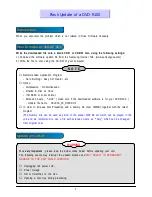
Appendices : Glossary
Page 283
N
•
NTSC:
signal The standard composite video signal adopted by the NTSC that has 525 interlaced lines at a
frame rate of 29.97 frames per second. AKA Never Twice the Same Color due to the constantly changing
color rendition in early analogue TV broadcasts.
O
•
overscan:
A video monitor condition in which the raster extends slightly beyond the physical edges of
the CRT screen, cutting off the outer edges of the picture.
P
•
PAL:
signal The most common composite video signal used in Europe. Describes the way in which color
used to be encoded in analogue signals, Phase Alternating Line. It has a frame rate of 25 fps.
•
pixel:
A single picture element. The smallest element in a graphic image. Pixels are combined with other
pixels to make up a graphic image. Picture quality increases as the number of pixels increase in a mea-
sured area of an image.
•
postroll:
is a preset period of time during a preview when a Clip will continue to play past the OUT point
before stopping or rewinding.
•
preroll
: is the process of rewinding videotapes to a predetermined cue point (for example, 6 seconds) so
the tapes are stabilized and up to speed when they reach the selected edit point (during recording or dig-
itizing of source material from a video deck).
•
pulldown:
In countries that use the PAL or SECAM video standards, film destined for television is photo-
graphed at 25 frames per second. The PAL video standard broadcasts at 25 frames per second, so the
transfer from film to video is simple; for every film frame, one video frame is captured. Theatrical features
originally photographed at 24 frame/s are simply sped up by 4% to 25 frame/s. This can cause a noticeable
increase in audio pitch, which is sometimes corrected using a pitch shifter. In the United States and other
countries that use the NTSC television standard, film is generally photographed at 24 frame/s. Color NTSC
video is broadcast at 29.97 frame/s. For the film's motion to be accurately rendered on the video signal, an
NTSC telecine must use a technique called the 3:2 pulldown to convert from 24 to 29.97 frame/s. The 3:2
pulldown is accomplished in two steps.
•
The first step is to slow down, or "pulldown" the film motion by 0.1%. This speed change is unnotice-
able to the viewer, and makes the film travel at 23.976 frame/s.
•
The second step of the 3:2 pulldown is the 3:2 step. At 23.976 frame/s, there are 4 frames of film for
every 5 frames of NTSC video:
•
These four frames are "stretched" into five by exploiting the interlaced nature of NTSC video. For
every NTSC frame, there are actually two complete images or "fields," one for the odd-numbered
lines of the image, and one for the even-numbered lines. There are, therefore, ten fields for every 4
film frames, and the telecine alternately places one film frame across two fields, the next across
three, the next across two, and so on. The cycle repeats itself completely after four film frames have
been exposed, and in the telecine cycle these are called the "A," "B," "C," and "D" frames, thus:
Summary of Contents for VCube
Page 1: ...USER MANUAL User Manual...
Page 9: ...Page 9 Document revision 22 Date 28th November 2012...
Page 13: ...Introduction VCube Keys Options Page 13 VCube Versions...
Page 231: ...Appendices HDTV Recorded Media Page 231 HDTV Recorded Media SDTV Recorded Media...
Page 264: ...Appendices Pro Tools VCube Operation Page 264 Pro Tools VCube Operation...
Page 270: ...Appendices Pro Tools and VCube Page 270...
Page 273: ...Appendices Pro Tools and VCube Page 273...
Page 274: ...Appendices Pro Tools and VCube Page 274...
Page 275: ...Appendices Sony 9 Pin RS422 Wiring Chart Page 275 Sony 9 Pin RS422 Wiring Chart...
Page 276: ...Appendices Sony 9 Pin RS422 Wiring Chart Page 276...
Page 277: ...Appendices Sony 9 Pin RS422 Wiring Chart Page 277...
Page 278: ...Appendices Sony 9 Pin RS422 Wiring Chart Page 278...









































